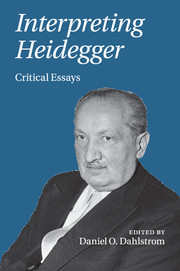Book contents
- Frontmatter
- Contents
- List of contributors
- Acknowledgments
- Method of citation and bibliography of Heidegger's works
- Introduction
- I Interpreting Heidegger's Philosophy
- II INTERPRETING HEIDEGGER'S INTERPRETATIONS
- 6 Being at the beginning: Heidegger's interpretation of Heraclitus
- 7 Being-affected: Heidegger, Aristotle, and the pathology of truth
- 8 Heidegger's interpretation of Kant
- 9 The death of God and the life of being: Heidegger's confrontation with Nietzsche
- 10 Heidegger's poetics of relationality
- III INTERPRETING HEIDEGGER'S CRITICS
- Index
- References
6 - Being at the beginning: Heidegger's interpretation of Heraclitus
Published online by Cambridge University Press: 11 April 2011
- Frontmatter
- Contents
- List of contributors
- Acknowledgments
- Method of citation and bibliography of Heidegger's works
- Introduction
- I Interpreting Heidegger's Philosophy
- II INTERPRETING HEIDEGGER'S INTERPRETATIONS
- 6 Being at the beginning: Heidegger's interpretation of Heraclitus
- 7 Being-affected: Heidegger, Aristotle, and the pathology of truth
- 8 Heidegger's interpretation of Kant
- 9 The death of God and the life of being: Heidegger's confrontation with Nietzsche
- 10 Heidegger's poetics of relationality
- III INTERPRETING HEIDEGGER'S CRITICS
- Index
- References
Summary
Herr Schulz, wenn ich nachdenke
dann ist es manchmal so
als ob Heraklit daneben steht.
Heidegger to Walter SchulzIn Heidegger's lexicon, “being” usually designates what, in this or that historical epoch, it means for any entity to be. Hence, it is not to be confused with a term designating any entity or set of entities, though it necessarily stands in an essential relation to human beings, as creatures uniquely capable of differentiating beings from what gives them meaning. But the meaning of being, so construed, must also be distinguished from what grounds or constitutes its essential correlation with human beings. Heidegger labels this ground the Ereignis. He also refers to it as Seynsgeschichte to signal the fact that, as part of this Ereignis, the history of interpretations of being constitutes and, in that sense, underlies our way of being and understanding being. In the process, this still-unfolding history takes hold of us in the ways we make this destiny our own, mindlessly or not. Indeed, in our preoccupation with particular beings (including the metaphysical preoccupation with them insofar as they exist, i.e., with the being of beings), this history easily escapes our notice. In the period from 1935 to 1945 Heidegger attempts to develop a kind of thinking that could become mindful of this history and thereby free from it (a freedom, it bears adding, that calls by no means for forgetting or dismissing it but for paying final respects to it).
- Type
- Chapter
- Information
- Interpreting HeideggerCritical Essays, pp. 135 - 155Publisher: Cambridge University PressPrint publication year: 2011
References
- 1
- Cited by

